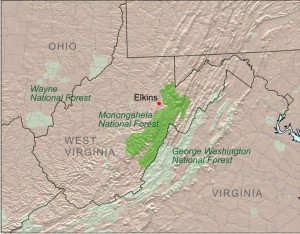Contact: Kelly Bridges, Public Affairs Officer @ kelly.bridges@usda.gov
Release Date: Mon Forest Towns, January 10, 2022
Eighteen months after formally establishing the Mon Forest Towns partnership, an initiative involving West Virginia University, USDA Rural Development, Monongahela National Forest, the Woodlands Development Group, and ten gateway communities, momentum continues to grow with a new five-year strategic plan.
The formal strategic plan was developed with participation from all the partners and will focus the towns on seven goals to help guide them individually and collectively toward sustainable recreation and economic growth:
Goal 1: Improve community health and wellness through promotion of outdoor recreation activities and infrastructure improvement.
Goal 2: Develop an outdoor recreation entrepreneurial culture by supporting the creation and growth of local recreation and tourism-based businesses.
Goal 3: Promote the uniqueness of the Mon Forest Towns and recreation opportunities in the region through collaborative regional marketing.
Goal 4: Develop world-class trails and outdoor recreation opportunities in the Mon Forest Towns region.
Goal 5: Increase employment opportunities in recreation-related fields to build a year-round recreation economy.
Goal 6: Create a downtown experience that recreationists would enjoy.
Goal 7: Develop a Sustainable Partnership Framework
The partnership has recently hired a grants coordinator and two new AmeriCorps members have joined the team through a partnership with the Appalachian Forest National Heritage Area. These positions will help increase capacity to leverage partnerships and secure funding through grants to build a sustainable economy around outdoor recreation while promoting healthy lifestyles and creating economic opportunities for residents.
Other recent achievements of the partnership include the grand opening of the Mower Basin Trail System as a part of the Snowshoe Highlands Ride Center; the installation of signs, wayfinding, and kiosks identifying points of interests in each of the ten Mon Forest Towns; the establishment of formal marketing and grant committees; and the selection of a grant-funded marketing agency to assist in further strategic planning and marketing.
Mountain biking continues to be a major focus for the partnership, especially with the recent establishment of the Snowshoe Highlands Ride Center. There are several trail systems that are designed, ready to be built or planned for future that will be added to the Ride Center at the following locations: Green Bank Observatory, Monday Lick Trails, Watoga State Park, and additional trails at the Mower Basin Trail System and Snowshoe Mountain.
With funding from the Benedum Foundation and WVU, a team is working to gather information and gauge attitudes on recreation economic development in the Monongahela National Forest area. They have developed a survey to provide data about regional collaboration on the recreation economy from residents who live in one of the eight counties (Grant, Tucker, Randolph, Greenbrier, Webster, Nicholas, Pendleton, and Pocahontas) in the Mon Forest Towns partnership. Residents can access the survey on the WVU website. The data gathered will help the team understand opinions on recreation economic development and will be used to strengthen the link between communities and public/private sectors in promoting sustainable community development around recreation.
Learn all about the Mon Forest towns partnership and recreational opportunities.

